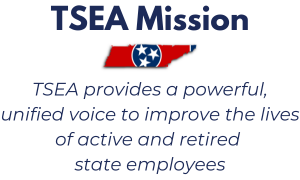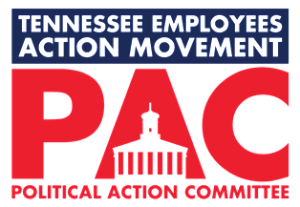Important Bills for State Employees Pass in final days of session
Grandfathering TDOT Employees without a GED SB1705 (Niceley) / HB1542 (Bailey)
As amended, this bill passed without opposition, requiring TDOT to reestablish positions (not higher than a salary grade 15), which do not require a GED. While this bill does not help every TDOT worker that does not have a GED to date, it is important because it recreates the position which was needed for anyone to be grandfathered in. Under this bill, to be eligible, the TDOT employee would have to:
- Be eligible for full service retirement on or before September 1, 2016;
- Have completed a department-approved program to obtain a high school diploma or equivalent certification, including taking the test by or before September 1, 2015; and
- Apply, interview, be selected for, and be placed in such a position by no later than September 1, 2015.
TSEA will continue to work this summer and next legislative session to ensure jobs for anyone without a GED and those that have not obtained their CDL by September of 2015. Both legislative branches are concerned about this move by the department to change the job requirements and are committed to making further adjustments next year.
Thanks are in order to the sponsors of this bill, Representative Paul Bailey and Senator Niceley. We also thank the Legislators listed below who signed on as co-sponsors to show support for TDOT employees affected by the recent restructuring changes and requirements: Fitzhugh, Butt, Swann, Halford, Calfee, Travis, Keisling, Holt, Lollar, Ragan, Faison, Matheny, Hawk, Coley, J. DeBerry, Windle, Marsh, T. Hill, Moody, Pitts, Jones, Odom, Shaw, Jernigan, Powell, Tidwell, K. Williams, D. Carr, G. Johnson, Southerland, and Bowling.
Healthy Workplace Bill HB 1981 (Parkinson) / SB 2226 (Kyle)
On the last day of session, the Healthy Workplace Bill passed both the House & Senate. Tennessee is the first state to pass such legislation, and we are proud to be part of its passing. This bill will establish proactive policies to address workplace issues beyond the scope of present harassment law which only applies to federal protected classes. This summer, TACIR will study this area and create a policy to be used by the State and Local governments. The policies will be implemented in July of 2015.
This bill seeks to address repeated mistreatment of an employee, which is abusive conduct that is threatening, intimidating, humiliating, work sabotage, or verbal abuse. According to a February 2014 survey from the Workplace Bullying Institute, 27% of Americans have suffered this type of abusive conduct at work and another 21% have witnessed it. 72% of Americans are aware that this workplace misconduct is happening.
It is good to have a proactive policy within an agency that holds the abuser accountable and liable. Presently the employer does not have the tools to protect the victim or the entity, without a policy in place. Employers need the policy to have a remedy or avenue to address these issues, particularly for the workers that do not fall under a federal protected class. While a policy does not deter bad conduct, it does give managers the tools to act and discipline an abuser accordingly.
For more information on this movement to end workplace harassment, please go to: http://www.healthyworkplacebill.org
Killed in the Line of Duty Estate Pay HB2228 (Calfee) /SB2268 (Yager) One of a few bills funded in the Governor’s budget was HB228 which entitles the estate of any correctional officer employed by the state who is killed in the line of duty to receive $25,000. This is in addition to any life insurance that he/she may have been carrying. Rep. Calfee recognizes that employees in many departments put their lives on the line daily, but because of the fiscal note, this bill could only cover one department. Expect more bills to do this same thing for other departments in the upcoming legislative years. Thank you to Senator Yager and Representative Calfee for leading this effort and for always realizing what employees have to risk every day when they go to work.
Other items in the Budget
NO Increase in Health Insurance Premiums in January, 2015
Our health insurance reserve fund is currently 200 percent over the necessary funding. Earlier this year, TSEA met with the Governor and B&A to make the Administration aware of this reserve surplus and recommended it be spent on providing financial relief for state workers. TSEA even carried a bill to force the discussion on the issue. The result: The supplemental budget that passed last week eliminated a 5.5 percent health insurance premium increase for 2015. This means that state employees will not see an increase to their health insurance premiums until January of 2016.
Turney Center – 200 Additional Beds
TSEA has advocated for several years for the Dept. of Correction to fully utilize the Turney Center Facility in Wayne County. Last year, the department announced that it planned to increase the beds by 200. This year, the budget funded this expansion. Wayne County has been waiting patiently for these beds, which means more jobs in the community.
Bad Bill passes Legislature
Limitations on Employee Rights from Workplace Harassment SB2126 (Johnson) / HB1954 (V. Dennis) This bill, brought forward by the NFIB and Chamber of Commerce, seeks to limit the amount of damages that could be granted in lawsuits due to workplace harassment, and has the potential to affect other areas regarding workplace discrimination. While the worst part of this bill, the Whistleblower section, was eliminated in the amended version, TSEA was still opposed to this bill. First, the bill removes all common law protections for whistleblowers and makes the TN Public Protection Act their exclusive remedy. This would remove the “substantial factor” standard from whistleblower cases and force all terminated whistleblowers to prove that their termination was “solely” because of their protected activity. That means that if an employer can point to any other reason, even if it is slight or trivial, for the employee’s termination the employee is left unprotected. This bill is bad public policy because it weakens the protections of the law for employees who are courageous enough to take an ethical stand against wrongdoing, even at great risk to their jobs. And instead of allowing appropriate relief to persons who expose corporate wrongdoing, their relief is limited. This is hardly deterrence to illegal activity in our state.
Please see prior legislative updates for any bill that was not covered this week. In addition, a full re-cap of all legislation will be included in the next Co-Worker.











